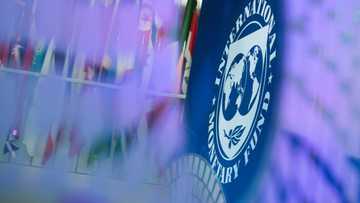IMF Maintains 3.2% Growth for Nigeria's Economy Despite Rising Inflation Rate
- The International Monetary Fund has said Nigeria’s growth projection in 2023 has not changed from 3.2%
- According to IMF, the yearly average rate of global growth will drop from 3.5 percent to 3.0 percent
- The growth prediction for emerging market and developing economies is mostly unchanged for 2023 and 2024.
PAY ATTENTION: Click “See First” under the “Following” tab to see Legit.ng News on your Facebook News Feed!
The International Monetary Fund, IMF, is still expecting Nigeria's economy to increase by 3.2 percent in 2023, according to the IMF World Economic Outlook Update for July on Near-Term Resilience, Persistent Challenges.
This follows Legit.ng report that the IMF slightly downgraded its assessment for the world economy while maintaining its forecast that despite economic concerns and geopolitical unrest, most nations will escape a recession in 2023.

Source: UGC
Meanwhile, the IMF in its most recent report lowered its forecast for Sub-Saharan economic growth in 2023 by 0.1 percentage point to 3.5 per cent.
The Fund however raised its forecast for global economic growth in 2023 by 0.2 percentage points to 3.5 per cent.
PAY ATTENTION: Join Legit.ng Telegram channel! Never miss important updates!
Forecast for 2023-2024
The IMF predicts that between 2023 and 2024, the yearly average rate of global growth will drop from 3.5 percent to 3.0 percent. The growth projections for 2023 have been increased from those in the April 2023 WEO by 0.2 percentage points, but there has been no change for 2024.
It went on to say that the forecast for 2023–24 is anticipated to be much lower than the historical (2000–19) yearly average of 3.8 percent. Additionally, it is below the historical average for a range of income levels in terms of both the overall GDP and the per capita GDP.
Additionally, it noted that from 2022 to 2023, advanced economies will continue to be the primary causes of the economic slowdown, with stronger services activity outweighing weaker manufacturing and special circumstances. Despite major regional variances, the growth prediction for emerging market and developing economies is mostly unchanged for 2023 and 2024.
The fourth quarter of 2022 was predicted to mark the pinnacle for annualised global growth. In several large economies, it won't likely hit its lowest point until the second half of 2023.
The fund predicted that growth in sub-Saharan Africa would fall to 3.5 percent in 2023 before rising to 4.1 percent in 2024. According to April predictions, growth in Nigeria is expected to gradually slow down in 2023 and 2024 as a result of security concerns in the oil industry.
In South Africa, it expects growth to decline to 0.3 percent in 2023, reflecting power shortages, although the forecast has been revised upward by 0.2 percentage point since the April 2023 WEO, on account of resilience in services activity in the first quarter.
Advice to government
The aim, according to the fund, is to maintain financial stability in the majority of economies while attaining prolonged deflation.
Therefore, it was noted, central banks should continue to concentrate on reestablishing price stability as well as enhancing financial supervision and risk management. Countries should quickly provide liquidity if market tensions arise while reducing the chance of moral hazard.
Additionally, it recommends that central banks create fiscal reserves, with the makeup of the fiscal adjustment assuring targeted assistance for the most vulnerable. A smoother decrease in inflation towards goal levels and fiscal consolidation would be made possible by improvements to the economy's supply side.
IMF, experts detail areas of focus for Tinubu on first day in office
In a related news, Legit.ng reported that the International Monetary Fund (IMF) has requested that President Bola Tinubu's administration diversify Nigeria's sources of income.
At a virtual conversation on Nigeria's debt, Ari Aisen, the IMF's resident representative in Nigeria, made this statement.
He urged Tinubu to considerably lessen his dependency on borrowing to cover expenses.
Source: Legit.ng




